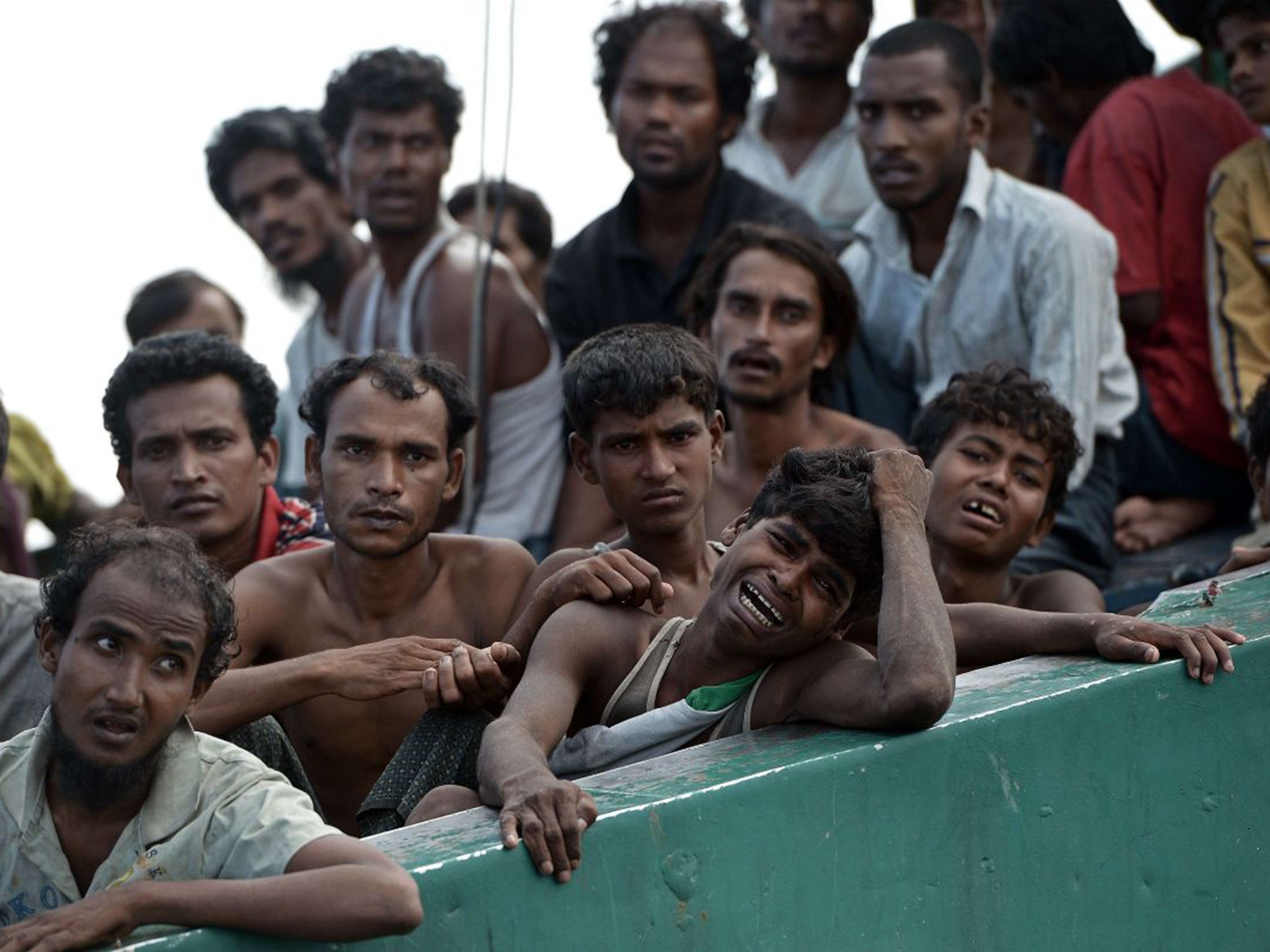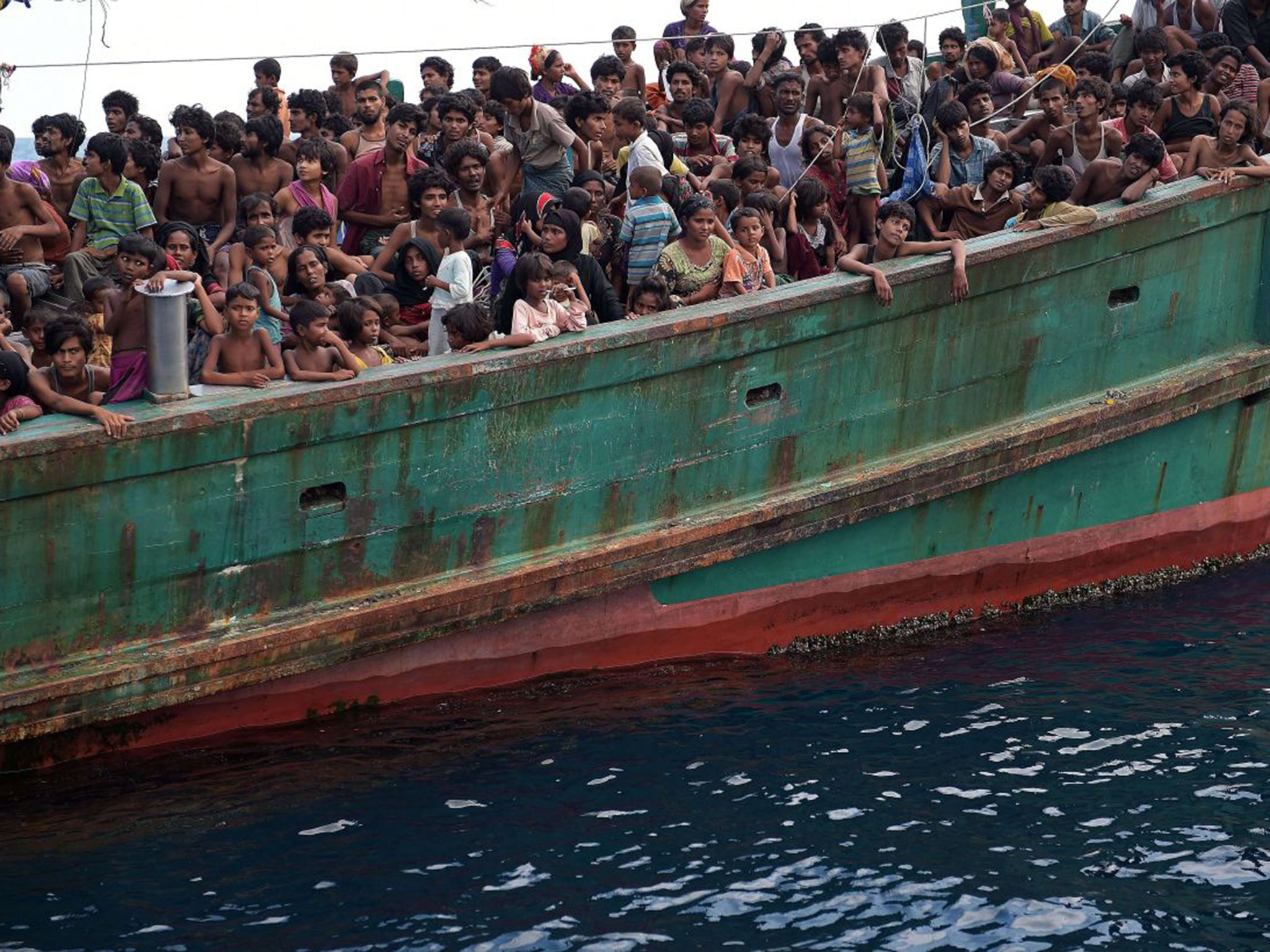Harrowing stories emerge as Burma boat people are cast adrift off Asia’s shores
The maritime refugee crisis in the Andaman Sea is the biggest on the continent since the flood of Vietnamese boat people in the late 1970s

Your support helps us to tell the story
From reproductive rights to climate change to Big Tech, The Independent is on the ground when the story is developing. Whether it's investigating the financials of Elon Musk's pro-Trump PAC or producing our latest documentary, 'The A Word', which shines a light on the American women fighting for reproductive rights, we know how important it is to parse out the facts from the messaging.
At such a critical moment in US history, we need reporters on the ground. Your donation allows us to keep sending journalists to speak to both sides of the story.
The Independent is trusted by Americans across the entire political spectrum. And unlike many other quality news outlets, we choose not to lock Americans out of our reporting and analysis with paywalls. We believe quality journalism should be available to everyone, paid for by those who can afford it.
Your support makes all the difference.Manu Abdul Salam, a young Rohingya woman and one of 800 boat people to reach the Indonesian village of Langsa, said, "If I had known that the boat journey would be so horrendous, I would rather have just died in Mynanmar [Burma]."
Her wooden boat was one of three towed into harbour in eastern Aceh in the island of Sumatra on Friday. But others bearing an estimated 8,000 more people continued to wallow in the Andaman Sea, refused permission to land by Thailand, Indonesia and Malaysia, in the biggest Asian maritime refugee crisis since the flood of Vietnamese boat people in the late 1970s.
Manu's story is harrowing. She described how, several days before, the ship's captain had destroyed the engine and fled by speed boat, apparently after receiving a phone call. With food and water running short, tempers flared between the Rohingyas and Bangladeshis on board, and her 20-year-old brother was one of dozens killed in violent clashes between the two Muslim communities.
"They thought the captain was from our country," she told Associated Press in tears, "so they attacked us with sticks and knives. My brother is dead." Her report of violence and death was confirmed by a Bangladeshi survivor, who said he and others had been lured aboard with promises of well-paid work in Malaysia, but once on the ship they had been starved and abused by the captain, who rang their families to demand money. "When we asked for water, the captain hit us with wire," he said.
The spokesman for Burmese President Thein Sein, in Burma's first official comment about the crisis, said, "We cannot say that the migrants are from Myanmar unless we can identify them." Mr Ye Htut went on, "Most victims of human trafficking claim to be from Myanmar [Burma], it is very easy and convenient for them."
The illegal trafficking of Rohingya, victims of sustained persecution in Burma's Arakan state where they are denied citizenship and described as illegal immigrants from Bangladesh, with which Arakan shares a porous border, has been in full spate for three years, since an explosion of anti-Muslim violence in 2012. They have been joined by poor Bangladeshis seizing what is sold to them as the opportunity to find better-paid work. The UN refugee agency says that more than 100,000 have left, most taken south to Malaysia which has a steady demand for unskilled labour.
The present crisis erupted after Thai authorities carried out a crackdown on illegal trafficking camps, prompting many of the traffickers to abandon their boats in mid-ocean.
Malaysian Prime Minister Najib Razak was quoted yesterday as saying the "humanitarian catastrophe" was a global issue to be resolved by the international community. "We allow some of them [from Burma] to land and provide humanitarian aid to them but Malaysia must not be burdened with this problem as there are thousands more waiting to flee from their region," Mr Najib told the state news agency Bernama.

An emergency conference of the nations affected will be convened in Bangkok on 29 May, but with no country willing to budge - Indonesia has said it will take in no more ships - a quick resolution appears unlikely. Burmese officials have suggested they may not attend the conference if the word Rohingya was used, as the government does not recognise the term.
In what was interpreted as an attempt to exert some pressure on Burma, President Obama has renewed for one year his authority to maintain sanctions on the country. The White House noted that "despite significant progress...concerns persist over...human rights abuses, particularly in ethnic minority areas and Rahine [Arakan] state."
Zeid Ra'ad al Hussein, the United Nations Human Rights chief, said, "I am appalled at reports that Thailand, Indonesia and Malaysia have been pushing boats full of vulnerable people back to sea, which will undoubtedly lead to many unavoidable deaths. The focus should be on saving lives, not further endangering them." He went on, "Until Burma's government addressed "the institutional discrimination against the Rohingya population, including access to citizenship, this precarious migration will continue."
A leader of the youth wing of Burma's National League for democracy, Nay Chi Win, told The Independent on Sunday, "We should treat them as human beings...Regardless of whether they are Bengali or Rohingya, they are victims. The highest priority, not only for Burma but for the whole world is to save the victims."
Join our commenting forum
Join thought-provoking conversations, follow other Independent readers and see their replies
Comments